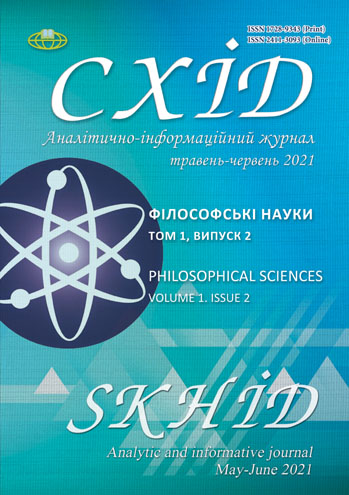THE REFLECTION ON THE CONCEPT OF UNIVERSALS AND ITS SOCIAL-HISTORICAL VERIFICATION
DOI:
https://doi.org/10.21847/1728-9343.2021.1(2).227385Keywords:
universals, conceptual-normative paradigm, social contract theory, laissez-faire doctrine, liberal-conservative order in EuropeAbstract
In this article, the author reviews the concept of singular and general. The analysis focus on the problem of universals during social-historical transformation. The author illustrates the manifestation of universals as a category during the Antiquity and the Modern era. The author argues that the shift in perception of Natural law, making an individual the central unit of analysis, happened during the Modernity. This shift leads to the creation of the concept of the social contract and the development of the idea that the will of individuals within a given society has to be the state's law.
Therefore, a historical paradox occurred, where private property and laissez-faire economic doctrine simultaneously became the causes for development and a foundation for objection to the conceptional-nominalist paradigm. The consecutive historical development was connected with mass attempts of different social groups to implement individual freedom, anti-etatism, rationalism. This led to shaping the social paradigm of modernity as well as to moderate conservative way of thinking and recognizing the practical falsity of extreme forms realism and nominalism.
This influence of various social groups resulted in the establishment of moderate conservatism in the contemporary social paradigm and the invalidation of radical realism and nominalism. This fact is confirmed by the dominance of liberal-conservative consensus in Modern Europe. Synthesizing the different approaches to the historical experience of formation and evolution of realism and nominalism, it also explores the role and significance theoretical reflection on Universals in the process of social reconstruction.
Downloads
References
Berdyaev, N.A. (1990). Istoki i smysl russkogo kommunizma. Moskow: Nauka. (In Russian)
Burke, E.(1955). Reflections on the Revolution in France.New-York, 1955.
Istina i blago: universalnoye i singulyarnoye (2002). Mos-cow: Institute of Philosophy of the Russian Academy of Sciences (In Russian).
Kotarbiński, T. (1963). Spor ob universaliyakh v sredniye veka (translate from Polish). In: Izbrannyieproizvedenia. Moscow. (In Russian).
Mikhnik, A. (1995). Oksamytova revolyutsiya (VelvetRevolu-tion). Suchasnist. Literatura, nauka, mystetstvo, suspilnezhyttya. 4: Р.61-66 (In Ukrainian).
Narskiy, I.S. (1981). Problema universaliy i diskussiyana XVI V semirnom filosofskom kongresse. In.: Filosofiya i mi-rovozzrencheskiye problemy sovremennoy nauki. Mos-kow: 269-298. (In Russian).
Neretina, S.S. (1995). Veruyushchiy razum. K istorii sred-nevekovoy filosofii. Arkhangelsk. (In Russian).
Neretina, S.S. (1996). Slovo i tekst v srednevekovoy kulture. Kontseptualizm PetraAbelyara. Moscow. (In Russian).
Neretina, S.S., Ogurtsov, A.P. (2006). Puti k universaliyam. Moscow: Izdatelstvo RKHGA. (In Russian).
Solovyov, V.S. (1992). Dazhe yesli Boga net, chelovek ne Bog. In: Marksizm: Pro i contra. (In Russian)
Tocqueville, Alexis de. (2008). Staryy poryadok і revolyutsiya (translate from French). St.Petersburg: Aleteyya.(In Russian)
Downloads
Published
How to Cite
Issue
Section
License
Copyright (c) 2021 Ihor Pasko

This work is licensed under a Creative Commons Attribution-NonCommercial-NoDerivatives 4.0 International License.
1. Authors bear responsibility for the accuracy of facts, quotations, numbers and names used.
2. Manuscripts are not sent back.
3. The publisher does not always agree with the authors' opinion.
4. The authors reserve the right to authorship of the work and pass the first publication right of this work to the journal under the terms of a Creative Commons Attribution-NonCommercial-NoDerivatives 4.0 International License. This license allows others to distribute (copy) the published work for non-commercial purposes, provided there is mandatory attribution to its authors and a link to the first publication in our journal.
5. The authors have the right to conclude separate supplement agreements that relate to non-exclusive work distribution in the form in which it has been published by the journal (for example, to upload the work to the online storage of the journal or publish it as part of a monograph), provided that the reference to the first publication of the work in this journal is included.

